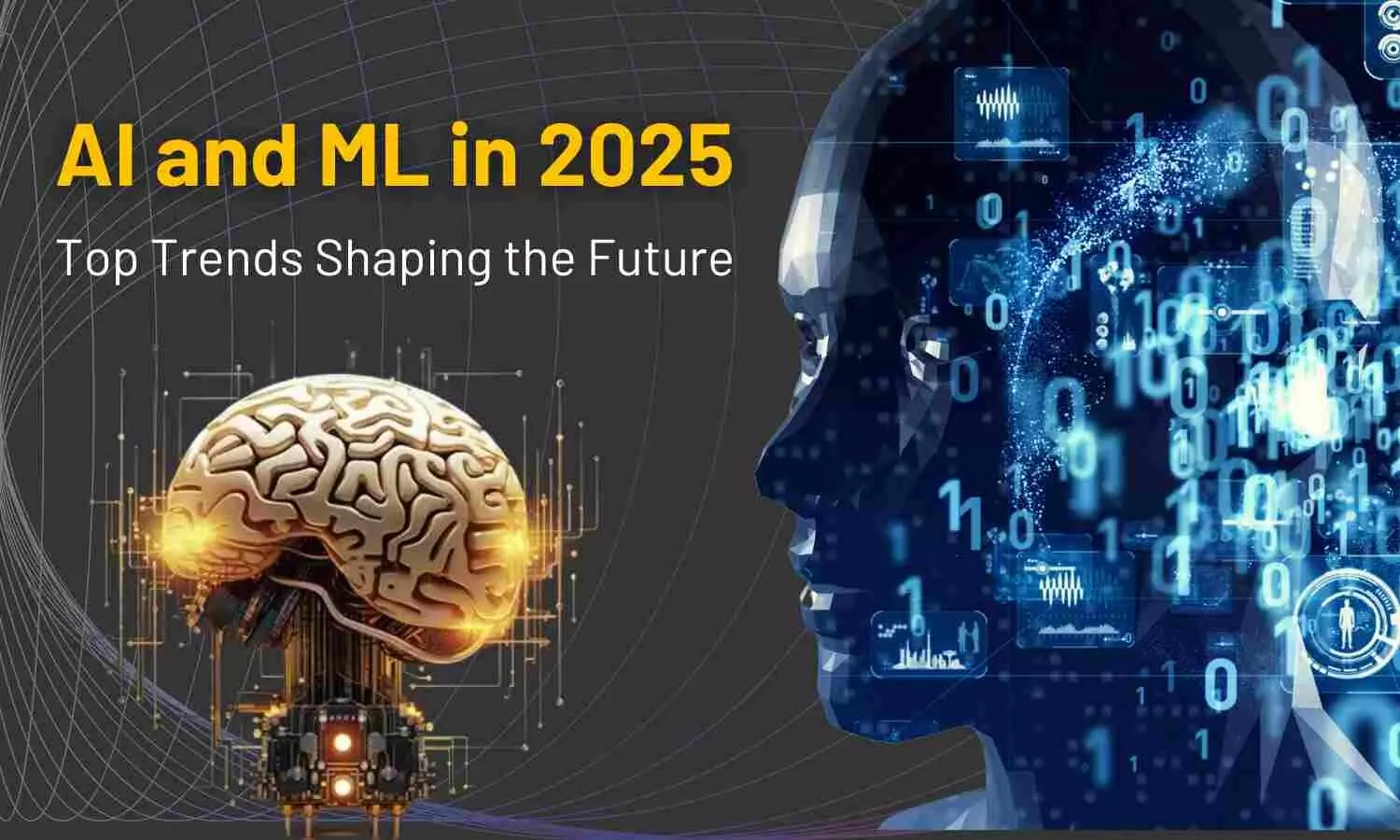AI and ML in 2025: Top Trends Shaping the Future
Artificial intelligence (AI) and Machine Learning (ML) are continuing to evolve at a rapid pace and their impact on industries worldwide is becoming more profound.
AI and ML in 2025: Top Trends Shaping the Future

By 2025, we are expected to witness a range of AI-driven advancements that will reshape how businesses and society’s function. From healthcare to financial services, AI is set to drive significant transformation across sectors.
Below are the top 10 AI and ML trends to watch out for in 2025.
1. Widespread Adoption of Generative AI
Generative AI, which creates content based on data inputs, is set for mass adoption. By 2025, industries such as advertising, entertainment, design, and content creation will see widespread use of generative AI. This technology enables businesses to create personalised content at scale, increasing engagement and efficiency. The global AI market, estimated to reach $407 billion by 2027, underscores the growing importance of generative AI, with an annual growth rate of 37.3% expected from 2023 to 2030.
2. AI-Driven Automation in the Workplace
McKinsey predicts that up to 50% of current work activities could be automated between 2030 and 2060. This shift is anticipated to enhance labour productivity, with potential annual growth of 0.1 to 0.6 percentage points by 2040. As automation takes over repetitive and data-heavy tasks, employees will be able to concentrate on more complex, higher-value work.
3. AI in Healthcare
The healthcare industry is rapidly embracing AI, with 38% of healthcare providers already using computer-assisted diagnostics. By 2025, AI is expected to play a more significant role in improving diagnosis accuracy, developing personalised treatments, and accelerating drug discovery. These advancements could lead to better patient outcomes and more efficient healthcare delivery.
4. Advancements in Natural Language Processing (NLP)
Natural Language Processing (NLP) will continue to enhance human-machine communication. By 2025, we can expect major breakthroughs in NLP, making virtual assistants, chatbots, and real-time translation services more effective and natural in their interactions. The global conversational AI market is predicted to reach $22.6 billion by 2024, reflecting the growing demand for sophisticated language processing tools.
5. Edge AI and Internet of Things (IoT) Integration
Edge AI, which processes data locally on devices instead of using centralised cloud servers, is expected to become increasingly common, particularly in sectors like manufacturing, autonomous vehicles, and remote operations. This approach minimises latency and allows for quicker, real-time decision-making, which is especially crucial in critical areas such as autonomous driving and industrial automation.
6. AI in Financial Services
The financial sector will continue to leverage AI for various applications, including fraud detection, algorithmic trading, and risk assessment. By 2025, AI will play an even bigger role in shaping the future of finance, offering more accurate predictive analytics and delivering personalised customer experiences. AI-driven solutions will provide insights that help financial institutions better understand and serve their clients.
7. Automated ML (AutoML)
AutoML is set to democratise ML by making it more accessible to non-experts. Businesses that previously lacked technical expertise will be able to implement AI solutions thanks to AutoML tools, which automate the process of creating ML models. This will enable a wider range of industries to benefit from AI without needing large teams of data scientists.
8. Federated Learning for Enhanced Data Privacy
Federated learning, a method that trains AI models across decentralised devices or servers without sharing sensitive data, will gain prominence in sectors like healthcare and finance, where privacy is paramount. This approach ensures data security while still allowing organisations to leverage AI for insights, making it particularly valuable in industries dealing with sensitive information.
9. AI-Driven Predictive Analytics
Predictive analytics powered by AI will become increasingly advanced, enabling organisations to make more strategic decisions based on data. These tools will excel at analysing customer behaviour, market trends, and business performance, allowing companies to anticipate future opportunities and challenges. Predictive analytics will help businesses stay ahead of the curve in competitive markets.
10. Ethical AI and Governance
As AI continues to become more ingrained in daily life, ethical and governance concerns are likely to increase. More robust frameworks and regulations will be in place to ensure AI is used responsibly, with a focus on maintaining transparency, fairness, and accountability. Both businesses and regulators will prioritise ethical AI, aiming to prevent biases and ensure that AI systems are deployed responsibly.
Shaping Tomorrow with Ethical AI
AI and ML are set to redefine industries in the coming years, bringing innovations that will streamline processes, improve decision-making, and transform customer experiences. However, alongside these advancements comes the responsibility to use AI ethically and with proper governance. The key to success will be in leveraging technologies that will benefit society as a whole.

